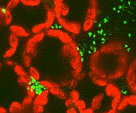Plant Pathology, Department of

Department of Plant Pathology: Faculty Publications
Document Type
Article
Date of this Version
2012
Citation
Chapter in 2012 Crop Production Clinic Proceedings, University of Nebraska-Lincoln Extension, Institute of Agriculture and Natural Resources, pp. 122-123.
Abstract
One of the most common management recommendations for plant diseases is the use of resistant or tolerant varieties/hybrids in your production system. However, there is common confusion on the definition and differentiation of susceptible, tolerant, and resistant varieties/hybrids from a plant pathology viewpoint. A susceptible variety/hybrid allows the pathogen to reproduce and causes significant disease development and in turn compromises the productivity of the plant (i.e., yield). A tolerant variety/hybrid allows the pathogen to reproduce and cause disease at the same or at a slightly reduced rate as a susceptible variety/cultivar; however, there is no noticeable reduction in the plant’s overall productivity. Finally, a resistant variety/hybrid limits or prevents pathogen reproduction and disease development; hence, plant productivity is little or not affected while the plant remains very productive. It is important to note that plant resistance is not plant “immunity,” where it is expected that a variety/hybrid will have NO disease. Unfortunately, immunity does not exist for the majority of plant diseases and expecting such a reaction (or lack thereof) is unrealistic. Resistance, simply, is a reduction in disease severity due to the plant’s defenses. Plants have many mechanisms for defense but do not possess immune systems comparable to our own that preclude infection and disease development.


Comments
Copyright © 2012 The Board of Regents of the University of Nebraska.